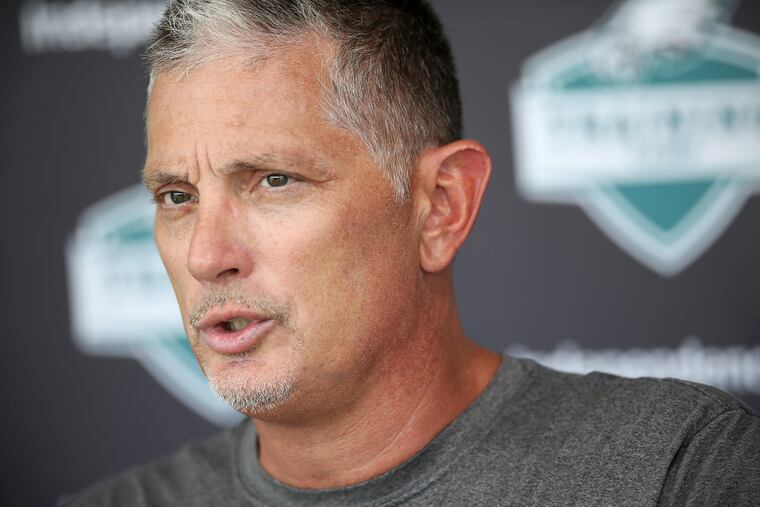Jim Schwartz tries to explain the inexplicable, then reassemble Eagles’ shattered defense
Everything the team had been doing well lately got turned on its head in a disaster of a loss at Miami. Can the Eagles rebound?

The Eagles defense was just starting to get its swagger back, with four solid performances in a row, when it went to Miami last weekend. What followed, Jim Schwartz said Wednesday, was something he never envisioned: Key penalties, 50-50 balls that his secondary repeatedly couldn’t come up with, fourth-down conversions.
Ultimately, humiliation, in a 37-31 loss at the hands of a team that started the season 0-7.
“That game is 100% on the defense,” Schwartz said. “We always feel, if you give us 20 points, we should win the game, and we certainly got more than 20. We didn’t do our jobs in that game, and, as a result, we got a loss.
“What has been our strength over the last month have been our corners defending one-on-one on the outside part of the field and playing tight coverage, and playing penalty-free. We didn’t get that done in this game."
» READ MORE: Mack Hollins the latest oddly timed release by the Eagles | Early Birds
The team’s defensive coordinator stepped up to the NovaCare auditorium lectern with a difficult assignment: Explain how in the world a Dolphins offense averaging 15 points a game scored five touchdowns on five possessions in the middle part of the contest. What neither he nor anyone else can tell us is whether this beatdown was fatal to his defense’s confidence and to the 5-7 Eagles’ hopes for this season.
Schwartz said it all started with the 28-yard wildcat-formation run that got the Dolphins into Eagles territory, down 10-0 after their first three possessions ended in an interception and a pair of third-down sacks. The defense seemed to regroup from the wildcat surprise, but on fourth-and-4 from the Eagles’ 43, Miami went for it, and DeVante Parker reached over Ronald Darby for a 43-yard touchdown pass.
“I really think that was such a critical point in that game, that just gave them life,” Schwartz said. “They were able to make that play – the quarterback threw a 50-50 ball up there, and they made it, we didn’t. Not only did they [convert on fourth down], they scored a touchdown … . When you combine those plays that they made and a penalty that keeps the drive alive, or them going for it on a fourth down, or whatever else, then you end up in the position that we were in.”
Schwartz said he made every adjustment he could think of, but 37-year-old Miami quarterback Ryan Fitzpatrick overcame them all. When Parker (seven catches, 159 yards, two touchdowns) was doubled, Fitzpatrick quickly went elsewhere with the ball. (All five of tight end Mike Gesicki’s catches, for 79 yards and a TD, came in the second half.) When the Eagles went to two safeties deep, Fitzpatrick found receivers over the middle.
“We went through a lot of different things to try to settle guys down," Schwartz said. "We had one series where I just said on the sideline, ‘Look, we’re just going to be basic defense just to settle down, training camp-type stuff.’ ”
He recalled that simplifying things worked in a game last season against Sunday’s opponent, the Giants. But it didn’t work against Miami.
“We really trimmed everything and just said, ‘Look, let’s just get comfortable and just go play.’ I think the quarterback went 6-for-6 and they scored a touchdown on that drive,” Schwartz said. “So, whether it was blitzing, whether it was playing zone, or whether it was playing sort of ‘bread and butter’ stuff for us defensively, it wasn’t our day. We have to take ownership for it. We have to take accountability for it. We cost our team that win.”
Schwartz said that in the last month or so, the Eagles were winning 50-50 balls at about a 65 percent rate. “I counted 13 50-50 balls [on Sunday], and we only won four of them. So, we were backwards. … some of those 50-50s were man, some were zone, some of them were blitz, some of them weren’t. We didn’t make the plays.”
Linebacker Kamu Grugier-Hill said, “We just couldn’t get ‘em off the field."
Grugier-Hill was the only defensive starter who spoke during a brief locker room availability. “They were just making the big plays, the explosive plays that we needed to stop.”
Watching the game film didn’t show him anything he didn’t see or sense Sunday as the disaster unfolded, Grugier-Hill said. Mostly, it showed contested catches being made, over and over.
“The formula that helped us to keep scoring down and keep us in games flipped the script on us,” Schwartz said. “We gave them second opportunities with fouls -- three offsides, two [defensive pass interference calls], and two roughing-the-quarterbacks.”
This week’s challenge was complicated by the news Wednesday that a high-ankle sprain is likely to keep Giants rookie quarterback Daniel Jones on the sideline. The Eagles probably will face a more familiar adversary, Eli Manning. This could be a good thing, or not. Jones is more athletic, but he’s also a rookie who doesn’t get the ball out as quickly as a veteran and doesn’t diagnose defenses as quickly. After what happened with Fitzpatrick, the prospect of facing an inexperienced quarterback had a lot of appeal.
“He’s still a two-time Super Bowl MVP,” Grugier-Hill said about Manning.
Regardless of who quarterbacks the 2-10 Giants, Schwartz’s task is to restore his players’ belief in their ability to do the things they did against the Bills, Bears, Patriots, and Seahawks.
“We need to get back to the standard that we had set the month before, playing clean football, playing penalty-free, or limiting penalties -- you’re never going to play 100% clean,” Schwartz said. “But, limiting your penalties, and then winning more of those balls on the outside part of the field.”